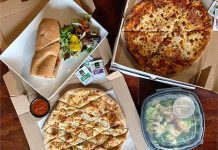By now, I'm sure that even the least nutrition-oriented single has heard the PSAs or read the constant stream of stories citing how breakfast is the most important meal of the day.
Sigh. It isn't an easy acknowledgement for me, because I rarely wake with an appetite for anything except coffee, and because, having grown up in the 1970s, "breakfast" traditionally consisted of some god-awful sugar-based cereal in whole milk, breakfast "pastries" and, later in life, bagels or muffins whose ingredients list I would not now want to read as a more educated consumer. Furthermore, after childhood, I grew up under the specter of the perception that eggs were entirely bad for you – and, as some of you may have read in this blog by now, the reality is not as simple as that according to some studies.
So the importance of breakfast is quite serious, but not something I have been easily able to adapt to. That said, the past few years have been entirely dedicated and focused on healthy eating and weight loss and that means taking breakfast more seriously. Not being a professional in nutrition, I am relying on the countless studies and articles I have read over the course of healthily shrinking my own waistline from 60 to 40 in two years without having ever felt hungry.
Just as studies suggested, I found that by eating the right breakfast, it prepared my system for healthy eating the rest of the day, reduced my appetite for unhealthy things later in the day, and made my entire day better from the start. Who knew back in 1978 that it could get better than sugary breakfast cereal chased with sugar-soaked milk?
Egad.
As I have read it, protein is key to a successful breakfast, in addition to slow-processing, healthy grains and your day's first dose of healthy vegetables and fruits. With a little research, I've found that putting together an ideal breakfast can set in motion a day of healthy eating as well as be utterly satisfying and propel me through the first half of my day.
This week, I will share my own personal strategy, based on available research. It starts with one of two bases – either a nonfat, low- or no-sugar Greek yogurt (about one single serving container or one cup) or Irish or steel-cut oatmeal. The former is one of the more ideal forms of protein; the latter is one of the most healthy grains. Both are good platforms upon which to build an ideal breakfast. When I follow the yogurt path, I make a complete but small meal by adding dried blueberries (very healthy and essential for men as they age), a small amount of healthy Kashi-brand cereal (for healthy grains and crunch), a drizzle of honey and sprinkle of cinnamon (both of which apparently have great health benefits). If I take the oatmeal option, I supplement it not with butter and sugar, but rather with a high-protein soy milk and the same berry-crunch, healthy cereal combination. In the case of either decision, I up the protein ante with a small piece of low-fat mozzarrella cheese, a small banana and about a cup of low-sodium vegetable juice or V8. The result is a well-balanced breakfast that kicks my metabolism off right and propels me through midday when it's time for a healthy lunch. There are plenty of variations here, in terms of fruits and berries to partner with the centerpiece. I often use almond milk instead of soy with the oatmeal, add almonds or walnuts to either base, and even some unsweetened shredded coconut. There are plenty of ways to alter flavoring without altering these overall nutritional powerhouse breakfasts. Individualize, yes, but do your own research about which changes you can make without losing the beneficial effects.
This approach to a healthy breakfast has been one of the top five things that I've learned about and incorporated into my own lifestyle that has been most beneficial in the healthy, notable weight loss I've experienced since my own attempts began. As the PSAs indicate, starting your day this way sets you up for a day of healthy eating. It will lead to midday appetite, but controlling and utilizing that healthy instinct to your own advantage is a subject for another day.
-Michael W. Sasser is Oklahoma Magazine’s senior editor and an award-winning journalist. Neither a medical nor nutrition expert, he shares his personal weight loss journey exclusively with Oklahoma Magazine readers. Reach him at [email protected]

























